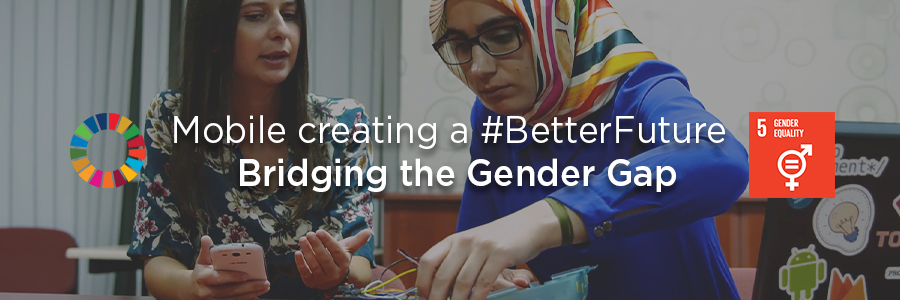
In 2020, it will be 25 years since the Beijing Declaration and Platform for Action was adopted. This declaration sets out how to remove the systemic barriers that hold women back from equal participation in all areas of life, both public and private. Despite some progress, real change has been agonisingly slow for the majority of women and girls in the world. Today, not a single country can claim to have achieved gender equality. Multiple obstacles remain unchanged in law and in culture. As a result, women remain undervalued, they continue to work more, earn less, have fewer choices, and experience multiple forms of violence at home and in public spaces.
Against this unequal backdrop, mobile technology has the power to transform women’s lives. It can help empower women, making them more connected and safer, and provide access to information, services and life-enhancing opportunities, such as health information and guidance, financial services and employment opportunities, often for the first time.
In low- and middle-income countries, 82 per cent of women now own a mobile phone and 54 per cent of women now use mobile internet, but there is still a long way to go. Women are also less likely than men to have advanced digital skills and remain underrepresented across different dimensions of ICT employment, entrepreneurship, and policy-making. On average, women constitute less than 35 per cent of ICT and related professions.
The digital gender gap is not going to close on its own. Its root causes are driven by a complex set of social, economic and cultural barriers. Targeted intervention is needed by industry, policymakers, the development community and other stakeholders to address the barriers faced by women.
The mobile industry is committed to accelerating the achievement of the United Nations Sustainable Development Goals (SDGs). These represent a collective commitment to end poverty, reduce inequalities, protect the environment and promote peace globally. SDG 5, Gender Equality, highlights the specific work needed to achieve gender equality. In fact, none of the 17 SDGs can be achieved without achieving SDG 5 first. Mobile operators across the globe are leading a number of initiatives to increase women’s access to mobile phones, enhance their skills and increase female leadership in technology.
Women’s access to mobile phones and mobile services are crucial first steps to address the digital gender divide. Yet across low- and middle-income countries, women are less likely than men to own and use mobile phones. Often, it is those marginalised women who are without access to a mobile and all its services who would benefit most from using one. Equipping women with mobiles, bringing them online and enabling them to access a wealth of information and services can also have a positive impact on their families and communities, and help to achieve many of the SDGs.
A lack of digital skills and confidence prevents many women from using mobile handsets and services. If women lack the skills and confidence to use mobile handset and services including mobile internet, they risk missing out on the benefits of connectivity and will be left behind as societies and economies digitise. Women are also less likely to have advanced digital skills which can have significant ramifications for women’s full participation in the digital society not just as digital users but also as digital professionals and innovators. Reducing the digital skills gender gap will ensure women benefit from greater connectivity and will also improve their representation and impact in the mobile and tech industries This is increasingly important as we face the 4th Industrial Revolution with 90 per cent of future jobs requiring digital skills.
Although gains have been made, women’s representation remains low across different dimensions of ICT employment, entrepreneurship and policymaking. Increasing the number of female leaders in technology will not only lead to more representative technologies but will also contribute to economic growth, achieving the SDGs and women’s overall empowerment.
Get in touch
The GSMA works with mobile operators in collaboration with partners and international organisations on initiatives to close the gender gap globally. To get involved contact us by emailing [email protected]


